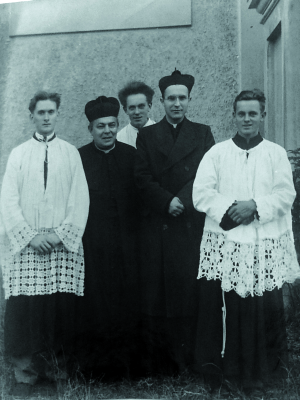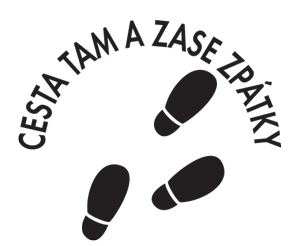The Minorite Monastery in Krnov - narrated by Abbot Josef Goryl
 The Krnov monastery of the Order of Friars Minor was founded in 1273 and with the exception of the Reformation period between 1523–1623, the monastery served its purpose until 1950. In 1950, the property was confiscated by the state and the activity of the Friars Minor was banned. In 1991, the monastery was restored to the Order of the Friars Minor and, in 2000, their monastic life was renewed.
The Krnov monastery of the Order of Friars Minor was founded in 1273 and with the exception of the Reformation period between 1523–1623, the monastery served its purpose until 1950. In 1950, the property was confiscated by the state and the activity of the Friars Minor was banned. In 1991, the monastery was restored to the Order of the Friars Minor and, in 2000, their monastic life was renewed.
About the closing down of the monastery in 1950
After the war, there was one friar who lived in a little house behind the church in Cvilín. The church was being repaired at that time as it was seriously damaged during the war. Nobody remained after the infamous Action K (on the night of April 13–14, 1950), both Cvilín and the monastery remained empty. All the monks along with brothers from other orders were deported at gunpoint accompanied by dogs to Bohosudov (loosely translated – Godsjudgment Village), where they were interned. After six months, roughly, some even later, they were released, but they were licensed to join the “elite black baron units” (Auxiliary Technical Battalions, penal military units assigned to perform heavy manual labour) for three or more years. Well, and some were sentenced to prison. None of ours, the Minorite Order, were sentenced then. That was only after the year 1958.
After 1950, when all the friars were interned, there were attempts to transform the monastery into a mental asylum for gravely affected children with the most difficult diagnoses. The children were to be taken care of by nuns brought here from Velehrad, in provisional conditions. There were 20 children and 10 nuns. The monastery was poor, the entire building was sustained on two toilets and there was no running water. The nuns had to carry it from a well on daily basis. Seven years later even the repressive state's officials had to admit that such conditions were inhuman, and the nuns and children were moved into a chateau in Jindřichov. So they were here until 1957 or 1958. What happened here afterwards, I have no information about that. I only know that previledged Russian officers lived here at around the time of the Prague spring, 1968. And then the monastery underwent reconstruction. In 1972 the monastery was turned into a hotel run by the state company Interhotel Ostrava. It was designed primarily for German citizens who returned to the places where they were born. The monastery hotel was an exclusive place to stay but, of course, as the pre-war generation aged, less visitors came every year. Until in the nineties, there were nearly none. Afterwards, because there was no longer any interest and due to the deteriorating state of the building and furnishings which were demanding repair, the entire property was returned to the order.
Heinrich Ponta as remembered by Josef Goryl
Heinrich Ponta was not a friar but he was the sexton in the Church of the Nativity of the Virgin Mary, helping and taking care of everything. He lived for the monastery and the pilgrimage church in Cvilín.
As an Austrian citizen, he was allowed to travel in and out of the country. During the fifties, he went twice to Austria. Upon his second return, he was arrested and accused of espionage. The reason was ludicrous. Ponta worked for the local bakeries, driving a delivery man with fresh bread and buns. One of the places he delivered the baked goods to, was an army barracks. This served as 'evidence' that he had information about the numbers and equipment of the army which he sold to the Vatican in order for them to prepare a coup. He was sentenced to eight years of prison but was released after two or three. Our brothers in Vienna helped by asking the Austrian authorities to intervene.
He was not officially a member of the Order, as it was not possible, but he was in contact with us even before he was arrested and he entered the Order secretly. Practically, he became a friar.
After three years of prison, he was released and had to leave the country in 48 hours. His entire property was subject to confiscation but since he had nothing, there was nothing to take. He left the country at the beginning of Summer but secretly came back in September for the great pilgrimage at Cvilín. He risked more years in prison, should he be discovered. Luckily, nobody noticed his presence and he made his back to Austria.
After some time, he was allowed to visit the country freely. I met him several times but we could not talk as there always was a swarm of State Security around him, making note of what he was doing a with whom he was talking to.
Heinrich Ponta was born on May 2, 1930, he took his wows on August 8, 1969 and he was ordained as a deacon on May 26, 1972. He died in Vienna on April 30, 2007.


 The Krnov monastery of the Order of Friars Minor was founded in 1273 and with the exception of the Reformation period between 1523–1623, the monastery served its purpose until 1950. In 1950, the property was confiscated by the state and the activity of the Friars Minor was banned. In 1991, the monastery was restored to the Order of the Friars Minor and, in 2000, their monastic life was renewed.
The Krnov monastery of the Order of Friars Minor was founded in 1273 and with the exception of the Reformation period between 1523–1623, the monastery served its purpose until 1950. In 1950, the property was confiscated by the state and the activity of the Friars Minor was banned. In 1991, the monastery was restored to the Order of the Friars Minor and, in 2000, their monastic life was renewed.































